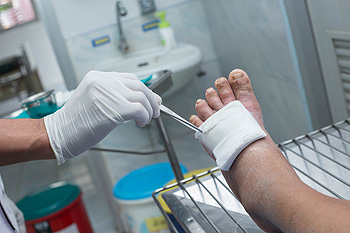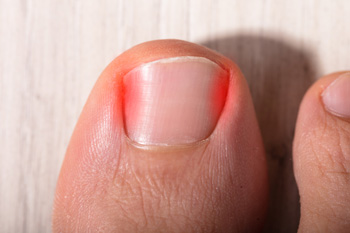Items filtered by date: August 2019
Why Do My Heels Hurt and What Can I Do About It?
Heel pain is a rather comm on foot problem. The pain will usually occur under the heel, towards the front of the heel, or just behind it, where the Achilles tendon connects to the heel bone. The most common cause of heel pain is plantar fasciitis, which is pain under the heel. Other causes include arthritis, heel bursitis and bumps, tarsal tunnel syndrome, stress fractures, Sever’s disease and Achilles tendinitis. The most common remedies for heel pain are rest, proper fitting footwear and applying ice to the afflicted area. If you are experiencing some kind of heel pain, it is suggested to go see a podiatrist.
on foot problem. The pain will usually occur under the heel, towards the front of the heel, or just behind it, where the Achilles tendon connects to the heel bone. The most common cause of heel pain is plantar fasciitis, which is pain under the heel. Other causes include arthritis, heel bursitis and bumps, tarsal tunnel syndrome, stress fractures, Sever’s disease and Achilles tendinitis. The most common remedies for heel pain are rest, proper fitting footwear and applying ice to the afflicted area. If you are experiencing some kind of heel pain, it is suggested to go see a podiatrist.
Many people suffer from bouts of heel pain. For more information, contact Dr. Kevin Davis of Davis Foot & Ankle Centers. Our doctor can provide the care you need to keep you pain-free and on your feet.
Causes of Heel Pain
Heel pain is often associated with plantar fasciitis. The plantar fascia is a band of tissues that extends along the bottom of the foot. A rip or tear in this ligament can cause inflammation of the tissue.
Achilles tendonitis is another cause of heel pain. Inflammation of the Achilles tendon will cause pain from fractures and muscle tearing. Lack of flexibility is also another symptom.
Heel spurs are another cause of pain. When the tissues of the plantar fascia undergo a great deal of stress, it can lead to ligament separation from the heel bone, causing heel spurs.
Why Might Heel Pain Occur?
- Wearing ill-fitting shoes
- Wearing non-supportive shoes
- Weight change
- Excessive running
Treatments
Heel pain should be treated as soon as possible for immediate results. Keeping your feet in a stress-free environment will help. If you suffer from Achilles tendonitis or plantar fasciitis, applying ice will reduce the swelling. Stretching before an exercise like running will help the muscles. Using all these tips will help make heel pain a condition of the past.
If you have any questions please contact one of our offices located in Springfield, and White House, TN, . We offer the newest diagnostic and treatment technologies for all your foot and ankle needs.
Read more about Heel PainWhy Do My Heels Hurt and What Can I Do About It?
Heel pain is a rather comm on foot problem. The pain will usually occur under the heel, towards the front of the heel, or just behind it, where the Achilles tendon connects to the heel bone. The most common cause of heel pain is plantar fasciitis, which is pain under the heel. Other causes include arthritis, heel bursitis and bumps, tarsal tunnel syndrome, stress fractures, Sever’s disease and Achilles tendinitis. The most common remedies for heel pain are rest, proper fitting footwear and applying ice to the afflicted area. If you are experiencing some kind of heel pain, it is suggested to go see a podiatrist.
on foot problem. The pain will usually occur under the heel, towards the front of the heel, or just behind it, where the Achilles tendon connects to the heel bone. The most common cause of heel pain is plantar fasciitis, which is pain under the heel. Other causes include arthritis, heel bursitis and bumps, tarsal tunnel syndrome, stress fractures, Sever’s disease and Achilles tendinitis. The most common remedies for heel pain are rest, proper fitting footwear and applying ice to the afflicted area. If you are experiencing some kind of heel pain, it is suggested to go see a podiatrist.
Many people suffer from bouts of heel pain. For more information, contact Dr. Kevin Davis of Davis Foot & Ankle Centers. Our doctor can provide the care you need to keep you pain-free and on your feet.
Causes of Heel Pain
Heel pain is often associated with plantar fasciitis. The plantar fascia is a band of tissues that extends along the bottom of the foot. A rip or tear in this ligament can cause inflammation of the tissue.
Achilles tendonitis is another cause of heel pain. Inflammation of the Achilles tendon will cause pain from fractures and muscle tearing. Lack of flexibility is also another symptom.
Heel spurs are another cause of pain. When the tissues of the plantar fascia undergo a great deal of stress, it can lead to ligament separation from the heel bone, causing heel spurs.
Why Might Heel Pain Occur?
- Wearing ill-fitting shoes
- Wearing non-supportive shoes
- Weight change
- Excessive running
Treatments
Heel pain should be treated as soon as possible for immediate results. Keeping your feet in a stress-free environment will help. If you suffer from Achilles tendonitis or plantar fasciitis, applying ice will reduce the swelling. Stretching before an exercise like running will help the muscles. Using all these tips will help make heel pain a condition of the past.
If you have any questions please contact our office located in Springfield, TN . We offer the newest diagnostic and treatment technologies for all your foot and ankle needs.
Possible Treatment of Plantar Hyperhidrosis
 If you have noticed excessive sweat coming from your feet, you may have a medical condition that is known as plantar hyperhidrosis. It can occur as a result of an overactive nervous system, obesity, or a thyroid disorder. There are disadvantages to having this condition, including slipping in open shoes that may cause the ankle to twist, or the foot slipping off the brake while attempting to stop the car. There are treatment options that do not require surgery which may help to obtain mild relief. These can include taking anti-anxiety drugs, botox injections, or taking specific medications that can induce drying. For severe cases, surgery may be a viable option which can include cutting the affected nerve. If you are suffering from this uncomfortable condition, it is strongly advised that you speak to a podiatrist who can offer the best treatment for you.
If you have noticed excessive sweat coming from your feet, you may have a medical condition that is known as plantar hyperhidrosis. It can occur as a result of an overactive nervous system, obesity, or a thyroid disorder. There are disadvantages to having this condition, including slipping in open shoes that may cause the ankle to twist, or the foot slipping off the brake while attempting to stop the car. There are treatment options that do not require surgery which may help to obtain mild relief. These can include taking anti-anxiety drugs, botox injections, or taking specific medications that can induce drying. For severe cases, surgery may be a viable option which can include cutting the affected nerve. If you are suffering from this uncomfortable condition, it is strongly advised that you speak to a podiatrist who can offer the best treatment for you.
If you are suffering from hyperhidrosis contact Dr. Kevin Davis of Davis Foot & Ankle Centers. Our doctor can provide the care you need to attend to all of your foot and ankle needs.
Hyperhidrosis of the Feet
Hyperhidrosis is a rare disorder that can cause people to have excessive sweating of their feet. This can usually occur all on its own without rigorous activity involved. People who suffer from hyperhidrosis may also experience sweaty palms.
Although it is said that sweating is a healthy process meant to cool down the body temperature and to maintain a proper internal temperature, hyperhidrosis may prove to be a huge hindrance on a person’s everyday life.
Plantar hyperhidrosis is considered to be the main form of hyperhidrosis. Secondary hyperhidrosis can refer to sweating that occurs in areas other than the feet or hands and armpits. Often this may be a sign of it being related to another medical condition such as menopause, hyperthyroidism and even Parkinson’s disease.
In order to alleviate this condition, it is important to see your doctor so that they may prescribe the necessary medications so that you can begin to live a normal life again. If this is left untreated, it is said that it will persist throughout an individual’s life.
A last resort approach would be surgery, but it is best to speak with your doctor to find out what may be the best treatment for you.
If you have any questions please feel free to contact one of our offices located in Springfield, and White House, TN, . We offer the newest diagnostic and treatment technologies for all your foot and ankle needs.
Read more about Hyperhidrosis of the FeetPossible Treatment of Plantar Hyperhidrosis
 If you have noticed excessive sweat coming from your feet, you may have a medical condition that is known as plantar hyperhidrosis. It can occur as a result of an overactive nervous system, obesity, or a thyroid disorder. There are disadvantages to having this condition, including slipping in open shoes that may cause the ankle to twist, or the foot slipping off the brake while attempting to stop the car. There are treatment options that do not require surgery which may help to obtain mild relief. These can include taking anti-anxiety drugs, botox injections, or taking specific medications that can induce drying. For severe cases, surgery may be a viable option which can include cutting the affected nerve. If you are suffering from this uncomfortable condition, it is strongly advised that you speak to a podiatrist who can offer the best treatment for you.
If you have noticed excessive sweat coming from your feet, you may have a medical condition that is known as plantar hyperhidrosis. It can occur as a result of an overactive nervous system, obesity, or a thyroid disorder. There are disadvantages to having this condition, including slipping in open shoes that may cause the ankle to twist, or the foot slipping off the brake while attempting to stop the car. There are treatment options that do not require surgery which may help to obtain mild relief. These can include taking anti-anxiety drugs, botox injections, or taking specific medications that can induce drying. For severe cases, surgery may be a viable option which can include cutting the affected nerve. If you are suffering from this uncomfortable condition, it is strongly advised that you speak to a podiatrist who can offer the best treatment for you.
If you are suffering from hyperhidrosis contact Dr. Kevin Davis of Davis Foot & Ankle Centers. Our doctor can provide the care you need to attend to all of your foot and ankle needs.
Hyperhidrosis of the Feet
Hyperhidrosis is a rare disorder that can cause people to have excessive sweating of their feet. This can usually occur all on its own without rigorous activity involved. People who suffer from hyperhidrosis may also experience sweaty palms.
Although it is said that sweating is a healthy process meant to cool down the body temperature and to maintain a proper internal temperature, hyperhidrosis may prove to be a huge hindrance on a person’s everyday life.
Plantar hyperhidrosis is considered to be the main form of hyperhidrosis. Secondary hyperhidrosis can refer to sweating that occurs in areas other than the feet or hands and armpits. Often this may be a sign of it being related to another medical condition such as menopause, hyperthyroidism and even Parkinson’s disease.
In order to alleviate this condition, it is important to see your doctor so that they may prescribe the necessary medications so that you can begin to live a normal life again. If this is left untreated, it is said that it will persist throughout an individual’s life.
A last resort approach would be surgery, but it is best to speak with your doctor to find out what may be the best treatment for you.
If you have any questions please feel free to contact our office located in Springfield, TN . We offer the newest diagnostic and treatment technologies for all your foot and ankle needs.
Foot Ulcers and Diabetes
 Patients with diabetes are often familiar with foot conditions that can develop as a result of this affliction. Research has indicated the importance of having regular foot examinations, as this can be helpful in noticing any cuts or wounds that have developed on the feet. Diabetes can produce tingling and numbing sensations in the feet. This may cause difficulty in feeling any cuts that are present on the feet, which can lead to infections. If the cuts are not properly cared for, foot ulcers may develop and gangrene may gradually develop. If you have diabetes, it is advised that you be under the care of a podiatrist who can manage this condition.
Patients with diabetes are often familiar with foot conditions that can develop as a result of this affliction. Research has indicated the importance of having regular foot examinations, as this can be helpful in noticing any cuts or wounds that have developed on the feet. Diabetes can produce tingling and numbing sensations in the feet. This may cause difficulty in feeling any cuts that are present on the feet, which can lead to infections. If the cuts are not properly cared for, foot ulcers may develop and gangrene may gradually develop. If you have diabetes, it is advised that you be under the care of a podiatrist who can manage this condition.
Diabetic foot care is important in preventing foot ailments such as ulcers. If you are suffering from diabetes or have any other concerns about your feet, contact Dr. Kevin Davis from Davis Foot & Ankle Centers. Our doctor can provide the care you need to keep you pain-free and on your feet.
Diabetic Foot Care
Diabetes affects millions of people every year. The condition can damage blood vessels in many parts of the body, especially the feet. Because of this, taking care of your feet is essential if you have diabetes, and having a podiatrist help monitor your foot health is highly recommended.
The Importance of Caring for Your Feet
- Routinely inspect your feet for bruises or sores.
- Wear socks that fit your feet comfortably.
- Wear comfortable shoes that provide adequate support.
Patients with diabetes should have their doctor monitor their blood levels, as blood sugar levels play such a huge role in diabetic care. Monitoring these levels on a regular basis is highly advised.
It is always best to inform your healthcare professional of any concerns you may have regarding your feet, especially for diabetic patients. Early treatment and routine foot examinations are keys to maintaining proper health, especially because severe complications can arise if proper treatment is not applied.
If you have any questions please feel free to contact one of our offices located in Springfield, and White House, TN, . We offer the newest diagnostic and treatment technologies for all your foot and ankle needs.
Read more about Diabetic Foot ConditionsFoot Ulcers and Diabetes
 Patients with diabetes are often familiar with foot conditions that can develop as a result of this affliction. Research has indicated the importance of having regular foot examinations, as this can be helpful in noticing any cuts or wounds that have developed on the feet. Diabetes can produce tingling and numbing sensations in the feet. This may cause difficulty in feeling any cuts that are present on the feet, which can lead to infections. If the cuts are not properly cared for, foot ulcers may develop and gangrene may gradually develop. If you have diabetes, it is advised that you be under the care of a podiatrist who can manage this condition.
Patients with diabetes are often familiar with foot conditions that can develop as a result of this affliction. Research has indicated the importance of having regular foot examinations, as this can be helpful in noticing any cuts or wounds that have developed on the feet. Diabetes can produce tingling and numbing sensations in the feet. This may cause difficulty in feeling any cuts that are present on the feet, which can lead to infections. If the cuts are not properly cared for, foot ulcers may develop and gangrene may gradually develop. If you have diabetes, it is advised that you be under the care of a podiatrist who can manage this condition.
Diabetic foot care is important in preventing foot ailments such as ulcers. If you are suffering from diabetes or have any other concerns about your feet, contact Dr. Kevin Davis from Davis Foot & Ankle Centers. Our doctor can provide the care you need to keep you pain-free and on your feet.
Diabetic Foot Care
Diabetes affects millions of people every year. The condition can damage blood vessels in many parts of the body, especially the feet. Because of this, taking care of your feet is essential if you have diabetes, and having a podiatrist help monitor your foot health is highly recommended.
The Importance of Caring for Your Feet
- Routinely inspect your feet for bruises or sores.
- Wear socks that fit your feet comfortably.
- Wear comfortable shoes that provide adequate support.
Patients with diabetes should have their doctor monitor their blood levels, as blood sugar levels play such a huge role in diabetic care. Monitoring these levels on a regular basis is highly advised.
It is always best to inform your healthcare professional of any concerns you may have regarding your feet, especially for diabetic patients. Early treatment and routine foot examinations are keys to maintaining proper health, especially because severe complications can arise if proper treatment is not applied.
If you have any questions please feel free to contact our office located in Springfield, TN . We offer the newest diagnostic and treatment technologies for all your foot and ankle needs.
Ingrown Toenails Can Cause Pain
The symptoms of an ingrown toenail can be quite noticeable. They typically consist of red and swollen skin on the sides of the big toe, and it generally causes pain and discomfort. It can occur as a result of wearing shoes that do not fit properly, and this can possibly cause the toenail to grow into the surrounding skin. If your child has an ingrown toenail, they may find mild relief when the affected toe is soaked in warm water. This may help to move the swollen portion of skin away from the nail. It may be beneficial to wear sandals as the healing process occurs, and this can help to keep pressure off of the nail. If you are afflicted with an ingrown toenail, it is strongly advised that you seek the counsel of a podiatrist who can properly treat this condition.
Ingrown toenails may initially present themselves as a minor discomfort, but they may progress into an infection in the skin without proper treatment. For more information about ingrown toenails, contact Dr. Kevin Davis of Davis Foot & Ankle Centers. Our doctor can provide the care you need to keep you pain-free and on your feet.
Ingrown Toenails
Ingrown toenails are caused when the corner or side of a toenail grows into the soft flesh surrounding it. They often result in redness, swelling, pain, and in some cases, infection. This condition typically affects the big toe and may recur if it is not treated properly.
Causes
- Improper toenail trimming
- Genetics
- Improper shoe fitting
- Injury from pedicures or nail picking
- Abnormal gait
- Poor hygiene
You are more likely to develop an ingrown toenail if you are obese, have diabetes, arthritis, or have any fungal infection in your nails. Additionally, people who have foot or toe deformities are at a higher risk of developing an ingrown toenail.
Symptoms
Some symptoms of ingrown toenails are redness, swelling, and pain. In rare cases, there may be a yellowish drainage coming from the nail.
Treatment
Ignoring an ingrown toenail can have serious complications. Infections of the nail border can progress to a deeper soft-tissue infection, which can then turn into a bone infection. You should always speak with your podiatrist if you suspect you have an ingrown toenail, especially if you have diabetes or poor circulation.
If you have any questions, please feel free to contact our office located in Springfield, TN . We offer the newest diagnostic and treatment technologies for all your foot care needs.
Ingrown Toenails Can Cause Pain
The symptoms of an ingrown toenail can be quite noticeable. They typically consist of red and swollen skin on the sides of the big toe, and it generally causes pain and discomfort. It can occur as a result of wearing shoes that do not fit properly, and this can possibly cause the toenail to grow into the surrounding skin. If your child has an ingrown toenail, they may find mild relief when the affected toe is soaked in warm water. This may help to move the swollen portion of skin away from the nail. It may be beneficial to wear sandals as the healing process occurs, and this can help to keep pressure off of the nail. If you are afflicted with an ingrown toenail, it is strongly advised that you seek the counsel of a podiatrist who can properly treat this condition.
Ingrown toenails may initially present themselves as a minor discomfort, but they may progress into an infection in the skin without proper treatment. For more information about ingrown toenails, contact Dr. Kevin Davis of Davis Foot & Ankle Centers. Our doctor can provide the care you need to keep you pain-free and on your feet.
Ingrown Toenails
Ingrown toenails are caused when the corner or side of a toenail grows into the soft flesh surrounding it. They often result in redness, swelling, pain, and in some cases, infection. This condition typically affects the big toe and may recur if it is not treated properly.
Causes
- Improper toenail trimming
- Genetics
- Improper shoe fitting
- Injury from pedicures or nail picking
- Abnormal gait
- Poor hygiene
You are more likely to develop an ingrown toenail if you are obese, have diabetes, arthritis, or have any fungal infection in your nails. Additionally, people who have foot or toe deformities are at a higher risk of developing an ingrown toenail.
Symptoms
Some symptoms of ingrown toenails are redness, swelling, and pain. In rare cases, there may be a yellowish drainage coming from the nail.
Treatment
Ignoring an ingrown toenail can have serious complications. Infections of the nail border can progress to a deeper soft-tissue infection, which can then turn into a bone infection. You should always speak with your podiatrist if you suspect you have an ingrown toenail, especially if you have diabetes or poor circulation.
If you have any questions, please feel free to contact one of our offices located in Springfield, and White House, TN, . We offer the newest diagnostic and treatment technologies for all your foot care needs.
Read more about Ingrown Toenail Care

